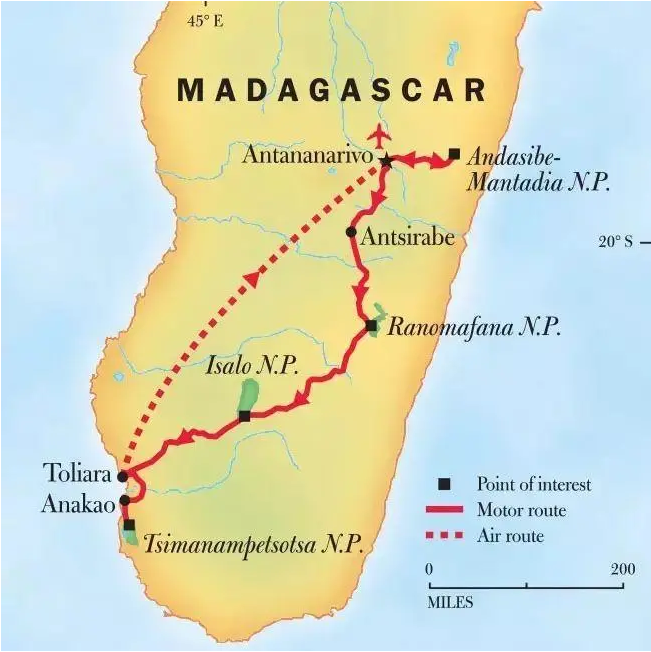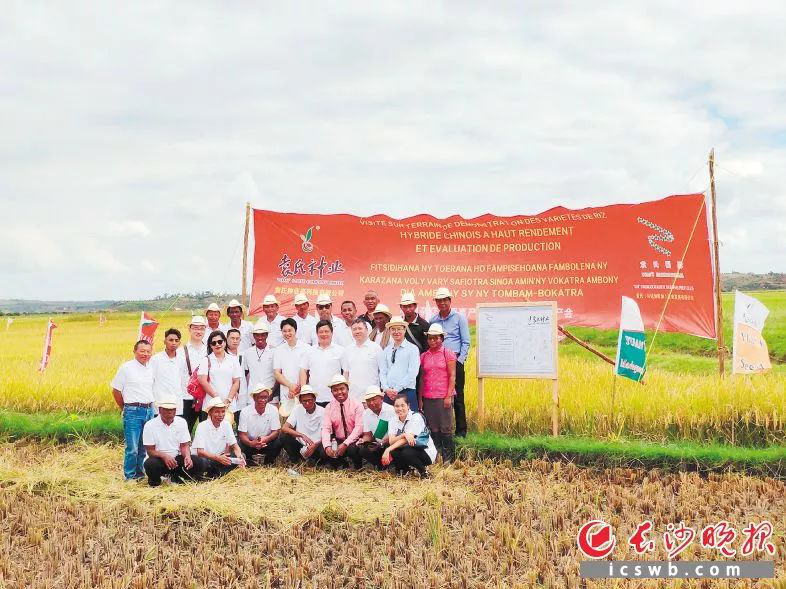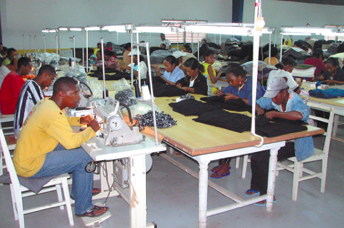Preface
China and Madagascar have strong complementarity in economic and trade cooperation, which means huge development space. Sino-Madagascar economic and trade cooperation starts from scratch, the fields of which has generally expanded and the base of which has become increasingly solid. In the three episodes, we will introduce to you information about investment, foreign trade of Madagascar, and the economic cooperation between China and Madagascar. Now, let's watch Episode 1 - Investment Guidelines in the Republic of Madagascar.

Madagascar is an island country in Africa, located in the west of the Indian Ocean and facing the African continent across the Mozambique Strait. The whole island is composed of volcanic rocks.
Its terrain is unique, and the climate varies greatly from region to region. The eastern part is of tropical rainforest climate, hot and humid all year round; the central part is of tropical plateau climate, which is mild; while the western part is at the leeward wide, and is of Savannah climate; and the southern part is of semi arid climate. The dry season of the island is from April to October, and the rainy season is from November to next March.
The economy is predominated by agriculture, and more than 80% of the total population work on agriculture. The industrial base is very weak.
China's Investment in Madagascar
China's direct investment in Madagascar is a stable flow, the stock of which has generally increased. But after a surge in 2017, it witnessed a huge drop in 2019.
The stock and flow of China's FDI into Madagascar accounted for a small share in all its FDI into Africa. China's FDI stock in Madagascar (USD 272.91 million) accounted for 0.61% of that across Africa (USD 44390.22 million).
[Typical Cases]
"Story Seeds of Central Africa": Madagascar Hybrid Rice Case
Since 2007, more than 20 agricultural technical experts have promoted the cultivation technology of hybrid rice in Madagascar. At present, Madagascar has become the country with the largest cultivation area and the highest yield of hybrid rice across Africa, and the first African country to develop the whole industrial chain of hybrid rice breeding, seeding, planting, processing and sales. Now, the cultivation area of hybrid rice in Madagascar exceeds 40,000 hectares, the production has thus increased by over 120,000 tons.

Burgeon time: In 2006, at the summit of Forum on China-Africa Cooperation, Chinese government committed to building ten agricultural demonstration centers of distinctive features for Africa within three years.
Start time: In August 2007, Hunan Academy of Agricultural Sciences was approved to undertake the project of "China-aided Hybrid Rice Demonstration Center in Madagascar," which was firstly launched as one of the top ten China-aided agricultural demonstration centers in Africa.
Built-up time: In 2012, the first hybrid rice research center operated by enterprises in Africa -- Madagascar Hybrid Rice Research Center was founded.
Collaborator: Hunan Academy of Agricultural Sciences and Yuan Seed Industry High-tech Co., Ltd.
Madagascar has now become the most commercial country in terms of rice across Africa.
China's Investment in Madagascar's Mining Industry Case: Ilmenite and Placer
Ilmenite and placer are concentrated on the east coast of Madagascar, while there is little volume of the two minerals on the west coast. Now 18 orefields have been detected, the deposit of which is coastal placer. The exploitation and development of the two minerals focus on Toamasina in the northern part of the east coast and Ambovombe in the south.
In November 2010, Madagascar Mainland Mining Co., Ltd., a joint venture co-founded by Guangdong Guangxin Mining Resource Group Co., Ltd. and Shenzhen No.7 Limited Company, obtained the right of mining, and was put into production in 2011. By June 2011, 60,000 tons of ilmenite and zircon ore had been produced and transported back to China for processing and smelting. The annual output of ilmenite and zircon concentrate was projected to be 4 million tons and 300,000 tons respectively, and the value of annual production was expected to exceed RMB 10 billion.
Madagascar Textile Producer of Kingdeer Cashmere Case
Madagascar Kingdeer Cashmere Co., Ltd. is the largest enterprise nationwide. It is from Inner Mongolia, boasting over 7,000 employees all over the world - "this enterprise, coming from Inner Mongolia, with more than employees worldwide, provides 20% employment opportunities for an African country, and creates one third of the industrial output value of an African country, which affects the industrialization process of the country to some extent."

Economic benefits: Provide job opportunities (more than 6,000 employees in Madagascar); cultivate local technical professionals (the localization rate has reached 80%, which is projected to be increased to 95% in the next two years), which has accelerated the growth of a large number of textile industries in Madagascar (over 100,000 textile employees have been cultivated by Kingdeer during the past 20 years); all the high-end cashmere products produced are exported to developed countries in Europe and America, greatly promoting the industrialization in African countries.
Kingdeer started training in the factories, teaching employees in Madagascar Chinese characters, carrying out basic education and imparting Chinese culture, which makes it become the first overseas enterprise to promote Chinese and spread Chinese culture as well as textile technology in Madagascar.
Madagascar Regulations and Policies on Foreign Investment
●What are the regulations on foreign investment market access?
Department in Charge of Investment
The investment authority in Madagascar is Madagascar Bureau of Economic Development, which is subordinate to the President Palace. Its main functions are as follows:
(1) Improve the business environment;
(2) Promote private investment;
(3) Handle investment-related formalities;
(4) Publicize the investment opportunities in Madagascar.
In order to facilitate investment facilitation, the Bureau has set up a "single window" for investment services from submitting applications to completing registration.
Regulations on Investment Industry
The law encouraging investment in Madagascar is the Investment Law. Investments in certain special areas (e.g. finance, insurance, mining, petroleum, telecommunications, medical, pharmaceutical and its auxiliary industries) are subject to the approval of relevant authorities. Madagascar has also issued specific laws to regulate economic activities in relevant industries, such as the Mining Law, the Handicraft Law, the Fisheries and Aquaculture Law and the Tourism Law, etc.
Domestic and foreign market entities in Madagascar should be treated as equals.
For investors from countries have signed reciprocal measures with Madagascar, double taxation can be avoided. Enterprises in Madagascar can independently manage themselves according to their own charters. Under the premise of complying with the Labor Law of Madagascar, enterprises have the independent personnel management right.
Regulations on Investment Mode
Madagascar encourages sole proprietorship, joint venture, leasing and other diversified investment methods, and foreign acquisition of local enterprises is also acceptable. Madagascar usually takes shares in real estate such as land and factory buildings. In some industries, the licensing system is implemented, which has no strict limit on the proportion of foreign investment. Investors can even hold 100% of the shares in the company. Investments in certain specific sectors such as banking, insurance, mining, petroleum, telecommunications, medical, medical 44 Madagascar pharmaceutical and its auxiliary industries are subject to the approval of relevant industry authorities for operation and their share ratio is subject to case approval.
Now, the major way for China-funded enterprises to enter the market of Madagascar is directly establishing local enterprises.
Development of Infrastructure BOT/PPP Mode
In December 2015, the National Assembly of Madagascar passed the Government and Social Capital Cooperation Act (PPP Act), which encourages the private sector to participate in infrastructure construction in Madagascar through BOT and PPP. The Act is intended to define the legal and institutional framework for the implementation of public-private partnerships, to tender projects under effective and transparent socio-economic conditions and optimize public expenditure. The Ministry of Territorial Rehabilitation, Housing and Public Engineering is in charge of affairs related to PPP.
Now, Chinese enterprises are proactively exploiting new mode of cooperation, launching projects with the characteristics of both PPP and EPC in Madagascar, such as CRBC Madagascar Capital Airport Expressway (West Line) Project, etc.
What Preferential Can Madagascar Provide for Foreign Investment?
●Preferential Policies:
In terms of investment protection, the Government of Madagascar secures the safety of investment and funds, and guarantees that foreign investors can freely transfer investment income after paying off taxes. The Government respects and protects private property rights. When there is governmental requisition or purchase for public construction, compensation shall be provided in line with the laws. Besides, in order to stabilize the expectations of foreign investors, the Government guarantees that their revenues can be freely transferred out just after simple declaration.
In terms of multilateral investment guarantee agencies, Madagascar joined the World Bank Multilateral Investment Guarantee Agency (MIGA) in 1989, committing itself to fulfilling the MIGA Agreement to provide non-commercial investment risk protection for investors.
With regard to African trade institutions, Madagascar is a member of African Trade Institution (ATI). Such institution provides protection against political risks for investors in trade and financial transactions.
In terms of preferential treatment, the main preferential treatment that encourages foreign investment includes:
(1) Foreign investors are allowed to purchase real estate in Madagascar, but they must provide relevant investment plans;
(2) Foreign natural persons and corporate legal persons are not allowed to directly purchase land in Madagascar, but they can freely sign land lease contracts with citizens and agencies of Madagascar without prior approval, the leasing term can be as long as 99 years, and can be renewed;
(3) Issue employment visa with a valid period of three years to foreign investors, their spouses and children shall be equally treated.
In terms of incentives, in order to promote foreign investment in real estate, the Government has also taken some other measures. The measures mainly include: Participate in the construction of industrial development zones, including the development and construction of duty-free demonstration zones in the Port of Tamatave; formulate relevant laws and regulations on national ecological tourism natural reserves; participate in the development and construction of future special economic zones. In addition, enterprises that intend to invest in major projects in Madagascar can engage in one-to-one discussions with relevant government authorities on preferential treatment.
●Industry Incentives
In 2006, Madagascar formulated the Madagascar Action Plan, which incorporates the following fields as priorities: tourism, mineral exploitation, marine fishing and freshwater aquaculture, textile and garment processing exports, handicrafts, agriculture and agricultural product development (especially organic agricultural development), information and communication technology development and infrastructure construction, etc. Madagascar's fiscal budget for 2017 adjusted its tax policies, reducing domestic taxes by 50 per cent for investments in agriculture. Investment areas including agriculture, tourism, mining, information and communication technologies, light industry and renewable energy resources were highly recommended in the Investment Guidelines (2019 Edition) issued by the Bureau of Economic Development in Madagascar.
Reviewed by: Zhao Yuhui and Jiang Yongfeng
Edited by: Li Haibo